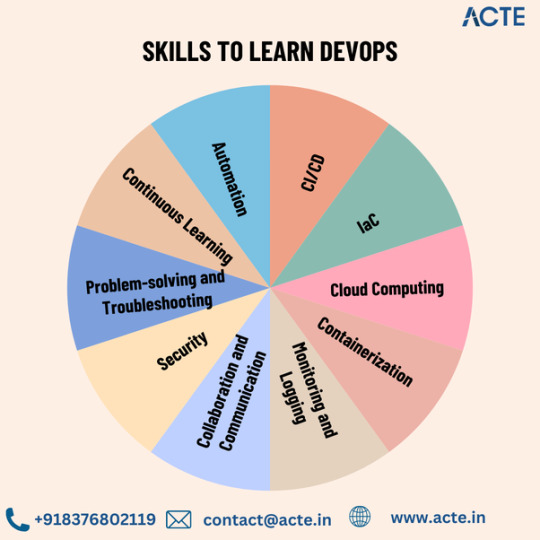#DevOpsMastery
Explore tagged Tumblr posts
Text
What Is DevOps? Is DevOps A Good Career?
In Recent Years, 𝐃𝐞𝐦𝐚𝐧𝐝 𝐅𝐨𝐫 𝐃𝐞𝐯𝐎𝐩𝐬 𝐄𝐱𝐩𝐞𝐫𝐭𝐬 𝐇𝐚𝐬 𝐑𝐢𝐬𝐞𝐧 𝐒𝐢𝐠𝐧𝐢𝐟𝐢𝐜𝐚𝐧𝐭𝐥𝐲 As A Large Number Of Companies Investigate What It Requires To Deploy DevOps Practices!
In This Blog, 𝐋𝐞𝐭 𝐔𝐬 𝐄𝐱𝐩𝐥𝐨𝐫𝐞 𝐖𝐡𝐚𝐭 𝐃𝐞𝐯𝐎𝐩𝐬 𝐈𝐬 And Discuss Some Of The Benefits Of Pursuing A Career In DevOps!!

#infycletechnologies#softwaretraininginstitute#DevOpsMastery#devopscourse#cloudcomputing#awsdevops#AzureDevOpsTraining
0 notes
Text
Practising DevOps: A Guide to the Best Online Platforms
DevOps, a combination of development and operations, has become an integral part of modern software development. It focuses on collaboration, communication, and automation to streamline the software development and delivery process. As more teams embrace DevOps practices, the demand for online platforms that support these methodologies has grown. In this blog, we will explore some of the best online platforms for practising DevOps, helping teams enhance collaboration, automate workflows, and accelerate the delivery of high-quality software. Explore top-notch DevOps training in Hyderabad to enhance your skills and accelerate your career. Gain hands-on experience with cutting-edge tools and methodologies, guided by industry experts. #ITTraining #DevOpsSkills #CareerBoost #HandsOnLearning.

1. GitHub: Collaborate and Contribute
GitHub is a fantastic platform where you can find real-world projects to collaborate on.
Explore repositories related to DevOps practices, fork them, make changes, and contribute.
Engaging with the community on GitHub exposes you to different perspectives and best practices.
2. GitLab: CI/CD in Action
GitLab not only provides version control but also has robust CI/CD (Continuous Integration/Continuous Deployment) capabilities.
Practice setting up pipelines and automating deployment processes in a controlled environment.
Utilize GitLab's features to grasp the fundamentals of CI/CD.
3. Microsoft Azure DevOps: Cloud-Centric Learning
Azure DevOps offers a comprehensive suite of tools for DevOps practices in the cloud.
Utilize their free tier to set up pipelines, manage repositories, and implement agile methodologies.
The platform's integration with Azure services enhances your cloud-centric DevOps skills.
4. Docker Playground: Container Orchestration
Docker Playground allows you to experiment with containerization without the need for installations.
Practice creating, deploying, and managing containers in a sandboxed environment.
Gain confidence in working with Docker before applying it to larger projects.
5. Stack Overflow: Problem-Solving Hub
Actively participate in DevOps-related discussions on Stack Overflow.
Pose questions, share your insights, and learn from the challenges others have faced.
The diverse community provides valuable feedback and alternative solutions. Elevate your tech journey with DevOps online courses – unlocking doors to innovation, one lesson at a time. 🚀🖥️ #DevOpsMastery #TechInnovation #OnlineLearningAdventure.

6. Meetups and Conferences: Networking and Insights
Attend local or virtual DevOps meetups and conferences.
Engage with professionals, share experiences, and stay updated on industry trends.
Networking can open doors to new learning opportunities and potential collaborations.
7. Online Courses and Tutorials
Enroll in DevOps courses on platforms like Udemy and Coursera.
Follow structured learning paths designed by industry experts.
These platforms often provide hands-on exercises and projects for practical application.
Choosing the right DevOps platform is crucial for successful implementation of continuous integration, continuous delivery, and collaborative development practices. The platforms mentioned in this blog cater to different needs and preferences, ensuring that teams can find the one that best aligns with their goals and workflows. By incorporating these online platforms into their development process, teams can enhance productivity, reduce manual errors, and deliver high-quality software faster in the ever-evolving landscape of software development.
0 notes
Text
Unlocking the Key Skills for Becoming a DevOps Expert
In the ever-evolving landscape of software development and IT operations, the role of a DevOps expert has become increasingly crucial. DevOps, a combination of development and operations, focuses on fostering collaboration, communication, and integration between software developers and IT operations professionals. To excel in this dynamic field, acquiring specific skills is essential. In this blog post, we will explore the key skills that can unlock the path to becoming a DevOps expert.
Explore top-notch DevOps training in Hyderabad to enhance your skills and accelerate your career. Gain hands-on experience with cutting-edge tools and methodologies, guided by industry experts. #ITTraining #DevOpsSkills #CareerBoost #HandsOnLearning

1. Automation: DevOps heavily relies on automation to streamline processes and eliminate manual tasks. It is crucial to have a strong understanding of automation tools like Jenkins, Ansible, or Puppet to automate build, deployment, and testing processes.
2. Continuous Integration and Continuous Deployment (CI/CD): CI/CD practices are at the core of DevOps. Understanding how to implement, configure, and manage CI/CD pipelines using tools like Git, Jenkins, and Docker is essential for efficient software delivery.
3. Infrastructure as Code (IaC): IaC involves managing infrastructure resources programmatically using tools like Terraform or CloudFormation. It is important to learn how to define and provision infrastructure resources using code, enabling scalability, consistency, and version control.
4. Cloud Computing: Familiarity with cloud platforms like AWS, Azure, or GCP is essential for modern DevOps practices. Understanding cloud concepts, provisioning resources, and managing cloud services will enable efficient infrastructure management and scalability.
5. Containerization: Containerization technologies like Docker and Kubernetes have become central to DevOps practices. Learning how to build, manage, and orchestrate containers will allow for easy deployment, scaling, and portability of applications. Elevate your tech journey with DevOps online courses – unlocking doors to innovation, one lesson at a time. 🚀🖥️ #DevOpsMastery #TechInnovation #OnlineLearningAdventure.

6. Monitoring and Logging: DevOps emphasizes continuous monitoring and feedback. Familiarity with monitoring tools like Prometheus, Grafana, or ELK Stack (Elasticsearch, Logstash, Kibana) is important to track application performance, detect issues, and analyze logs.
7. Collaboration and Communication: DevOps requires strong collaboration and communication skills. Being able to work effectively in cross-functional teams, adopt Agile methodologies, and effectively communicate with developers, operations, and stakeholders is crucial for successful DevOps implementation.
8. Security: Understanding security principles and best practices is essential for DevOps. Knowledge of secure coding practices, vulnerability scanning, and implementing security controls in CI/CD pipelines will ensure the integrity and safety of applications.
9. Problem-solving and Troubleshooting: DevOps professionals need to be skilled in problem-solving and troubleshooting. The ability to identify, analyze, and resolve issues efficiently is crucial for maintaining smooth operations and minimizing downtime.
10. Continuous Learning: Lastly, DevOps is a rapidly evolving field. Being open to continuous learning and staying updated with new tools, technologies, and industry trends is essential for a successful career in DevOps.
Becoming a DevOps expert requires a multifaceted skill set that goes beyond traditional development or operations roles. By mastering automation, containerization, CI/CD, collaboration, monitoring, security, and maintaining a commitment to continuous learning, individuals can unlock the key skills needed to thrive in the dynamic world of DevOps. As organizations increasingly embrace DevOps practices, those with these essential skills will play a pivotal role in driving innovation and ensuring the success of software development initiatives.
0 notes
Text
The Expanding Scope of DevOps: Revolutionizing Software Development and Operations
In the ever-evolving landscape of software development and operations, DevOps has emerged as a transformative force, redefining how organizations approach the entire software development lifecycle. Originally coined as a combination of "development" and "operations," DevOps is more than just a set of practices; it's a cultural shift that fosters collaboration and communication between traditionally siloed teams. In this blog post, we'll explore the expanding scope of DevOps and how it is revolutionizing the way software is developed and managed.
Navigate the future of tech seamlessly with DevOps training in Bangalore—a transformative learning experience awaits. 🎓🚀 #LearnDevOps #TechEvolution #FutureReady.

Collaboration between Development and Operations: DevOps emphasizes breaking down traditional silos between development and operations teams. Collaboration is at the core, ensuring that both teams work seamlessly together throughout the entire software development lifecycle. This collaborative approach enhances communication, reduces bottlenecks, and accelerates the delivery of high-quality software.
Continuous Integration and Continuous Delivery (CI/CD): CI/CD practices automate the integration, testing, and delivery of code changes, enabling a rapid and consistent release process. Continuous Integration ensures that code changes are regularly and automatically tested, while Continuous Delivery automates the deployment process. This results in shorter development cycles, faster time-to-market, and increased overall efficiency.
Infrastructure as Code (IaC): DevOps extends its reach into infrastructure management through Infrastructure as Code (IaC). IaC involves defining and managing infrastructure using code and automation tools. This approach ensures consistency, repeatability, and version control for infrastructure changes. IaC accelerates provisioning, minimizes manual errors, and aligns infrastructure with application development practices.
Automation of Repetitive Tasks: DevOps promotes the automation of repetitive and manual tasks, reducing human errors and improving efficiency. Automation tools are employed for tasks such as code deployment, configuration management, testing, and monitoring. By automating routine processes, teams can focus on more strategic and complex aspects of software development and operations.
Monitoring and Feedback Loops: Continuous monitoring is a key aspect of DevOps, providing real-time insights into application and infrastructure performance. Feedback loops enable teams to quickly identify and address issues, improving the overall reliability and stability of systems. Monitoring also supports data-driven decision-making and helps teams proactively respond to changing conditions.
Elevate your tech journey with DevOps online courses – unlocking doors to innovation, one lesson at a time. 🚀🖥️ #DevOpsMastery #TechInnovation #OnlineLearningAdventure.

DevSecOps - Integrating Security: Security is integrated into the DevOps process through DevSecOps. Rather than being an afterthought, security practices are embedded throughout the software development lifecycle. This proactive approach helps identify and address security vulnerabilities early in the process, reducing the risk of security breaches and ensuring that security is a shared responsibility across teams.
Microservices Architecture: DevOps aligns well with the microservices architectural pattern. Microservices involve breaking down applications into small, independent services that can be developed, deployed, and scaled independently. DevOps practices support the deployment and management of microservices, enabling organizations to achieve greater agility, scalability, and flexibility in adapting to changing business requirements.
Cultural Transformation: Beyond tools and processes, DevOps instigates a cultural shift within organizations. It encourages a mindset of continuous improvement, collaboration, and shared responsibility. This cultural transformation fosters a more agile, responsive, and innovative environment, where teams are empowered to adapt to changes rapidly and deliver value to end-users consistently.
The expanding scope of DevOps is reshaping the way organizations approach software development and operations. By breaking down silos, implementing CI/CD pipelines, embracing Infrastructure as Code, prioritizing monitoring and feedback loops, incorporating security practices, and adopting microservices architecture, DevOps is driving a revolution in the industry. As organizations continue to adopt and evolve their DevOps practices, the benefits of improved collaboration, faster releases, and enhanced overall efficiency will undoubtedly shape the future of software development and operations.
0 notes